2014年6月六级真题解析4
- 格式:ppt
- 大小:656.50 KB
- 文档页数:6
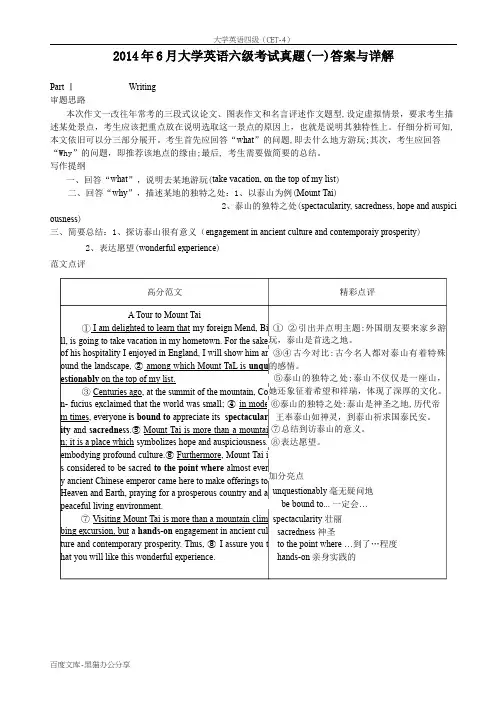
2014年6月大学英语六级考试真题(一)答案与详解Part Ⅰ Writing审题思路本次作文一改往年常考的三段式议论文、图表作文和名言评述作文题型,设定虚拟情景,要求考生描述某处景点,考生应该把重点放在说明选取这一景点的原因上,也就是说明其独特性上。
仔细分析可知,本文依旧可以分三部分展开。
考生首先应回答“what”的问题,即去什么地方游玩;其次,考生应回答“Why”的问题,即推荐该地点的缘由;最后, 考生需要做简要的总结。
写作提纲一、回答“what”,说明去某地游玩(take vacation, on the top of my list)二、回答“why”,描述某地的独特之处:1、以泰山为例(Mount Tai)2、泰山的独特之处(spectacularity, sacredness, hope and auspici ousness)三、简要总结:1、探访泰山很有意义(engagement in ancient culture and contemporaiy prosperity)2、表达愿望(wonderful experience)范文点评全文翻译泰山之旅欣闻我的外国朋友比尔要来我的家乡度假。
由于我在英国曾受到比尔的热情款待,我将带他四处看看家乡的风景。
在所有风景中,泰山无疑是首选之地。
几个世纪前,孔子登上泰山之巅,发出登泰山而小天下之感叹;在现代,每个人必定会去欣赏泰山的壮丽和神圣。
泰山不仅仅是一座山,她还象征着希望与祥瑞,体现了深厚的文化。
此外,泰山被看作是如此神圣,以至于几乎每位古代帝王都会到这里祭祀天地,祈求国家昌盛、国泰民安。
登泰山不仅是一次登山远足,还是一次亲身体验古代文化和现代繁荣的旅行。
因此,我向你保证你一定会喜欢这次美妙的旅行的。
PartⅡ Listening ComprehensionSection A1.W: I can’t seem to reach the tea at the back of the cupboard.M: Oh. Why don’t you use the ladder? You might strain your shoulder.Q: What does the man suggest the woman do?1. A)See a doctor about her strained shoulder. C)Replace the cupboard with a new one.B) Use a ladder to help her reach the tea.D)Place the tea on a lower shelf next time.【预测】四个选项都是动词短语,由此可推断该题会对建议或计划进行提问。
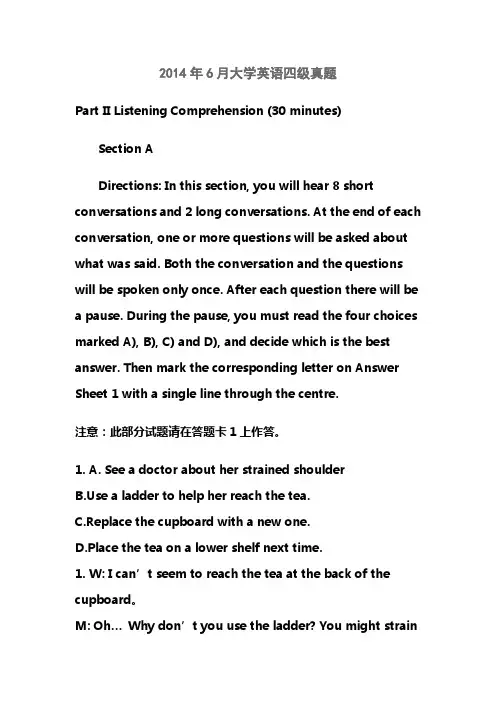
2014年6月大学英语四级真题Part II Listening Comprehension (30 minutes)Section ADirections: In this section, you will hear 8 short conversations and 2 long conversations. At the end of each conversation, one or more questions will be asked about what was said. Both the conversation and the questions will be spoken only once. After each question there will be a pause. During the pause, you must read the four choices marked A), B), C) and D), and decide which is the best answer. Then mark the corresponding letter on Answer Sheet 1 with a single line through the centre.注意:此部分试题请在答题卡1上作答。
1. A. See a doctor about her strained shouldere a ladder to help her reach the tea.C.Replace the cupboard with a new one.D.Place the tea on a lower shelf next time.1. W: I can’t seem to reach the tea at the back of the cupboard。
M: Oh… Why don’t you use the ladder? You might strain yourshoulder。
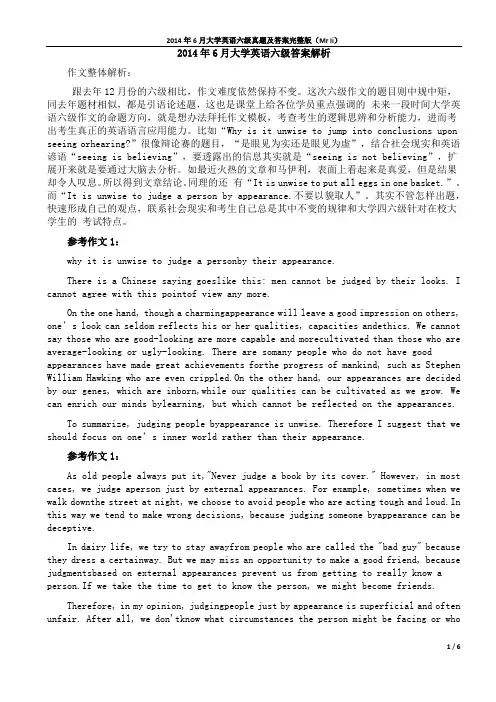
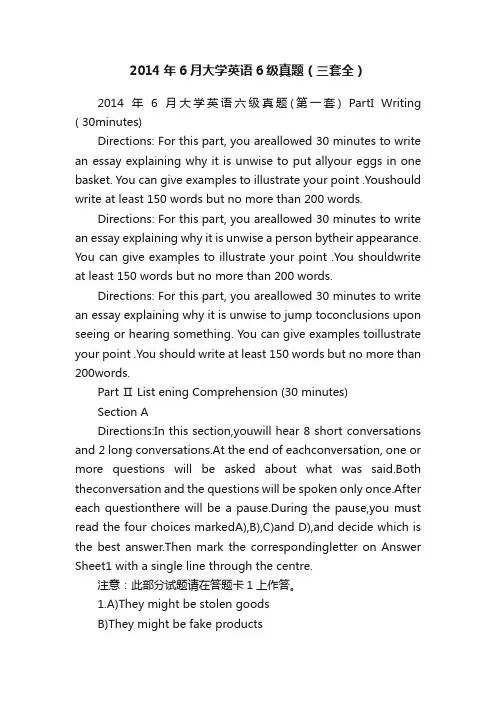
2014年6月大学英语6级真题(三套全)2014年6月大学英语六级真题(第一套) PartI Writing ( 30minutes)Directions: For this part, you areallowed 30 minutes to write an essay explaining why it is unwise to put allyour eggs in one basket. You can give examples to illustrate your point .Youshould write at least 150 words but no more than 200 words.Directions: For this part, you areallowed 30 minutes to write an essay explaining why it is unwise a person bytheir appearance. You can give examples to illustrate your point .You shouldwrite at least 150 words but no more than 200 words.Directions: For this part, you areallowed 30 minutes to write an essay explaining why it is unwise to jump toconclusions upon seeing or hearing something. You can give examples toillustrate your point .You should write at least 150 words but no more than 200words.Part Ⅱ List ening Comprehension (30 minutes)Section ADirections:In this section,youwill hear 8 short conversations and 2 long conversations.At the end of eachconversation, one or more questions will be asked about what was said.Both theconversation and the questions will be spoken only once.After each questionthere will be a pause.During the pause,you must read the four choices markedA),B),C)and D),and decide which is the best answer.Then mark the correspondingletter on Answer Sheet1 with a single line through the centre.注意:此部分试题请在答题卡1上作答。
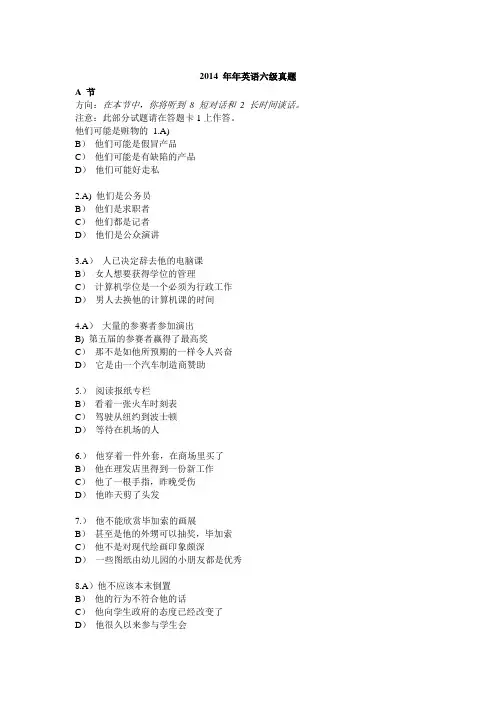
2014 年年英语六级真题A 节方向:在本节中,你将听到8 短对话和 2 长时间谈话。
注意:此部分试题请在答题卡1上作答。
他们可能是赃物的 1.A)B)他们可能是假冒产品C)他们可能是有缺陷的产品D)他们可能好走私2.A) 他们是公务员B)他们是求职者C)他们都是记者D)他们是公众演讲3.A)人已决定辞去他的电脑课B)女人想要获得学位的管理C)计算机学位是一个必须为行政工作D)男人去换他的计算机课的时间4.A)大量的参赛者参加演出B) 第五届的参赛者赢得了最高奖C)那不是如他所预期的一样令人兴奋D)它是由一个汽车制造商赞助5.)阅读报纸专栏B)看着一张火车时刻表C)驾驶从纽约到波士顿D)等待在机场的人6.)他穿着一件外套,在商场里买了B)他在理发店里得到一份新工作C)他了一根手指,昨晚受伤D)他昨天剪了头发7.)他不能欣赏毕加索的画展B)甚至是他的外甥可以抽奖,毕加索C)他不是对现代绘画印象颇深D)一些图纸由幼儿园的小朋友都是优秀8.A)他不应该本末倒置B)他的行为不符合他的话C)他向学生政府的态度已经改变了D)他很久以来参与学生会9 到11 的问题都基于你刚才听到的谈话9.A)她离开她自己的车停在曼彻斯特B)什么地方出毛病用她的车C)她想要在周末去旅行D)她车上拿下,t 是早在一周的时间10.A)安全B)大小C)安慰D)成本11.A)第三方保险B)增值税C)汽油D)车损险问题12 到15 基于你刚才听到的谈话12.A)如何更新基本设施B)怎样做才能提高他们的地位C)在哪里可以找到他们的植物D)如何吸引投资13.A) 他们与其他欧洲国家联系的路是快速B)他们都设在法国南部C)他们都非常靠近彼此D)其基本的设施都很好懂得可真) 尽量避免作出草率的决定B)利用到列车链接C)与地方当局的谈话D)先进行田野调查15.A) 未来产品分布B)本地工人的就业政策C)公路和铁路的链接,为小城镇的D)熟练的员工队伍,丘陵区B 节方向:在这部分中,你会听到 3 短的段落。
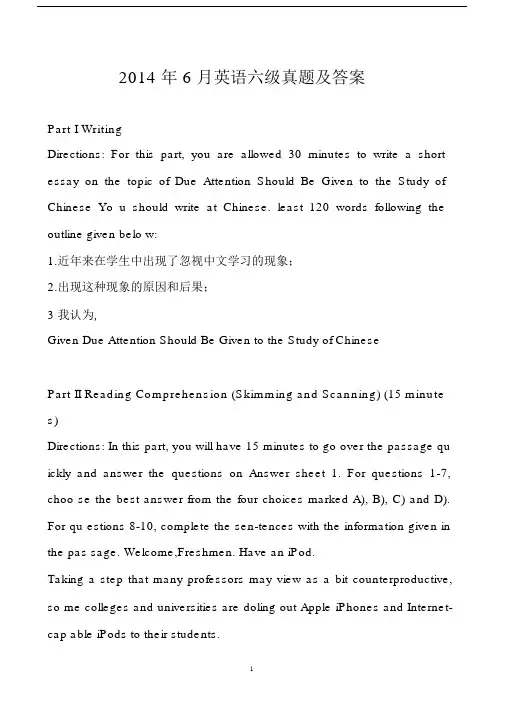
2014 年 6 月英语六级真题及答案Part I WritingDirections: For this part, you are allowed 30 minutes to write a short essay on the topic of Due Attention Should Be Given to the Study of Chinese Yo u should write at Chinese. least 120 words following the outline given belo w:1.近年来在学生中出现了忽视中文学习的现象;2.出现这种现象的原因和后果;3我认为,Given Due Attention Should Be Given to the Study of ChinesePart II Reading Comprehension (Skimming and Scanning) (15 minute s)Directions: In this part, you will have 15 minutes to go over the passage qu ickly and answer the questions on Answer sheet 1. For questions 1-7, choo se the best answer from the four choices marked A), B), C) and D). For qu estions 8-10, complete the sen-tences with the information given in the pas sage. Welcome,Freshmen. Have an iPod.Taking a step that many professors may view as a bit counterproductive, so me colleges and universities are doling out Apple iPhones and Internet-cap able iPods to their students.The always-on Internet devices raise some novel possibilities, like tracking where students gather together. With far less controversy, colleges could s end messages about canceled classes, delayed buses, campus crises or just the cafeteria menu.While schools emphasize its usefulness —online research in class and inst ant polling of students, for example — a big part of the attraction is, undou btedly, that the iPhone is cool and a hit with students. Being equipped with one of the most recent cutting-edge IT products could just help a college o r university foster a cutting-edge reputation.Apple stands to win as well, hooking more young consumers with decadesof technology pur- chases ahead of them. The lone losers, some fear, could be professors.Students already have laptops and cell phones, of course, but the newest de vices can take class distractions to a new level. They practically beg a user to ignore the long-suffering professor strug- gling to pass on accumulated wisdom from the front of the room — a prospect that teachers find most irr itating and students view as, well, inevitable.“ When it gets a little boring, I might pull it out,‖acknowledged Naomi P ugh, a first-year student at Freed-Hardeman University in Henderson, Ter m., referring to her new iPod Touch, which can connect to the Internet ove r a campus wireless network. She speculated that professors might try even harder to make classes interesting if they were to compete with the devices. Experts see a movement toward the use of mobile technology in educati on, though they say it is in its infancy as professors try to come up with us eful applications. Providing powerful hand- held devices is sure to fuel deb ates over the role of technology in higher education.“ We think this is the way the future is going to work,‖said Kyle Dickson, co-director of re- search and the mobile learning initiative at Abilene Chris tian University in Texas, which has bought more than 600 iPhones and 300 iPods for students entering this fall.Although plenty of students take their laptops to class, they don’t take the m everywhere and would prefer something lighter. Abilene Christian settle d on the devices after surveying students and finding that they did not like hauling around their laptops, but that most of them always carried a cell ph one, Dr. Dickson said.It is not clear how many colleges and universities plan to give out iPhones and iPods this fall; officials at Apple were unwilling to talk about the subje ct and said that they would not leak any institution plans’s.“ We can’t announce other people’s news,‖saidGreg Joswiak, vice presid ent of iPod and iPhone marketing at Apple. He also said that he could not d iscuss discounts to universities for bulk purchases.At least four institutions — the University of Maryland, Oklahoma Christi an University, Abilene Christian and Freed-Hardeman — have announced t hat they will give the devices to some or all of their students this fall.Other universities are exploring their options. Stanford University has hire d a student-run com-pany to design applications like a campus map and dir ectory for the iPhone. It is considering whether to issue iPhones but not sur e it, snecessary, noting that more than 700 iPhones were registered on the u niversity network’s last year.At the Massachusetts Institute of Technology, iPhones might alreadyhave been everywhere, if AT&T, the wireless carrier offering the iPhone in the United States,had a more reliable network, said Andrew Yu, mobile devices platform pro ject manager at M.I.T.“ We would have probably gone ahead with this, maybe just getting a thou sand iPhones and giving them out, ‖Mr. Yusaid.The University of Maryland at College Park is proceeding cautiously, givi ng the iPhone or iPod Touch to 150 students, said Jeffrey Huskamp, vice p resident and chief information officer at the university. ― Wedon’t think tha t we have all the answers, Mr‖. Huskamp said. By observing how students use the gadgets, he said,― We’ retrying to get answers from the students. ‖ At each college, the students who choose to get an iPhone must pay for mo bile phone service. Those service contracts include unlimited data use. Both the iPhones and the iPod Touch devices can connect to the Internet throu gh campus wireless networks. With the iPhone, those networks may provid e faster connections and longer battery life than A T&T’s data network. Many cell phones allow users to surf the Web, but only some newer ones are c apable of wireless connection to the local area computer network. University officials say that they have no plans to track their students (and Apple said it would not be possible unless students give their permission). They say that they are drawn to the prospect of learning applications outsid e the classroom, though such lesson plans have yet to surface.“ My colleagues and I are studying something called augmented reality (a field of computer research dealing with the combination of real-world and virtual reality), said‖ Christopher Dede, professor in learning technologies at Harvard University. ― AlienContact, for‖ example, is an exer- cise develo ped for middle-school students who use hand-held devices that can determi ne their location. As they walk around a playground or other area, text, vid eo or audio pops up at various points to help them try to figure out why ali ens were in the schoolyard.“ You can imagine similar kinds of interactive activities along historical li nes, ‖like following the Freedom Trail in Boston, Professor Dede said.― It’s important that we do research, so that we know how well something like this works. ‖The rush to distribute the devices worries some professors, who say that st udents are less likely to participate in class if they are multi-tasking. ― I ’m n ot someone who’s anti-technology, but I,m always worried that technology becomes an end in and of itself, and it replaces teaching or it replaces analysis,, said’Ellen Millender, associate professor of classics at Reed College in Portland, Ore. (She added that she hoped to buy an iPhone for herself on ce prices fall.)Robert Summers, who has taught at Cornell Law School for about 40 years,announced this week — in a detailed, footnoted memorandum — that he would ban laptop computers from his class on contract law.“ I would ban that too if I knew the students were using it in class, Profes‖sor Summers said of the iPhone, after the device and its capabilities were e xplained to him. ― Whatwe want to encour- age in these students is an activ e intellectual experience, in which they develop the wide range of complex reasoning abilities required of good lawyers. ‖The experience at Duke University may ease some concerns. A few years a go, Duke began giving iPods to students with the idea that they might use t hem to record lectures (these older models could not access the Internet).“ We had assumed that the biggest focus of these devices would be consu ming the content, said‖ Tracy Futhey, vice president for informationtechn ology and chief information officer at Duke.But that is not all that the students did. They began using the iPods to creat e their own ― content, making‖ audio recordings of themselves and presenti ng them. The students turned what could have been a passive interaction in to an active one, Ms. Futhey said. 注意:此部分试题请在答题卡 1 上作答。
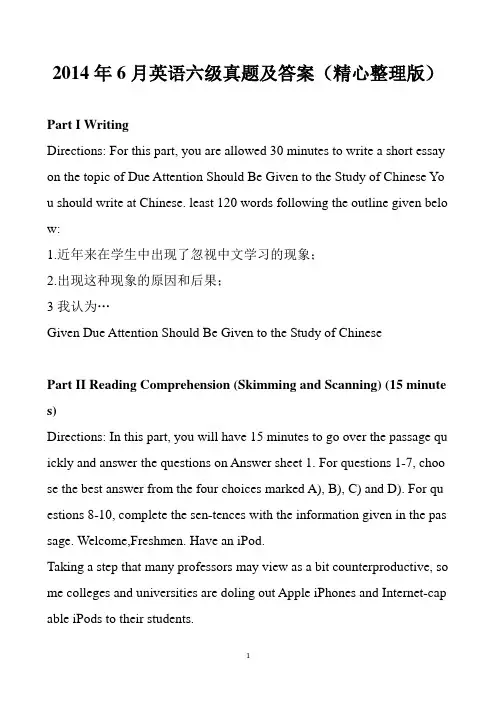
2014年6月英语六级真题及答案(精心整理版)Part I WritingDirections: For this part, you are allowed 30 minutes to write a short essay on the topic of Due Attention Should Be Given to the Study of Chinese Yo u should write at Chinese. least 120 words following the outline given belo w:1.近年来在学生中出现了忽视中文学习的现象;2.出现这种现象的原因和后果;3我认为…Given Due Attention Should Be Given to the Study of ChinesePart II Reading Comprehension (Skimming and Scanning) (15 minute s)Directions: In this part, you will have 15 minutes to go over the passage qu ickly and answer the questions on Answer sheet 1. For questions 1-7, choo se the best answer from the four choices marked A), B), C) and D). For qu estions 8-10, complete the sen-tences with the information given in the pas sage. Welcome,Freshmen. Have an iPod.Taking a step that many professors may view as a bit counterproductive, so me colleges and universities are doling out Apple iPhones and Internet-cap able iPods to their students.The always-on Internet devices raise some novel possibilities, like tracking where students gather together. With far less controversy, colleges could s end messages about canceled classes, delayed buses, campus crises or just the cafeteria menu.While schools emphasize its usefulness —online research in class and inst ant polling of students, for example — a big part of the attraction is, undou btedly, that the iPhone is cool and a hit with students. Being equipped with one of the most recent cutting-edge IT products could just help a college o r university foster a cutting-edge reputation.Apple stands to win as well, hooking more young consumers with decades of technology pur-chases ahead of them. The lone losers, some fear, could be professors.Students already have laptops and cell phones, of course, but the newest de vices can take class distractions to a new level. They practically beg a user to ignore the long-suffering professor strug-gling to pass on accumulated wisdom from the front of the room — a prospect that teachers find most irr itating and students view as, well, inevitable.“When it gets a little boring, I might pull it out,‖ acknowledged Naomi P ugh, a first-year student at Freed-Hardeman University in Henderson, Ter m., referring to her new iPod Touch, which can connect to the Internet ove r a campus wireless network. She speculated that professors might try even harder to make classes interesting if they were to compete with the devices. Experts see a movement toward the use of mobile technology in educati on, though they say it is in its infancy as professors try to come up with us eful applications. Providing powerful hand-held devices is sure to fuel deb ates over the role of technology in higher education.“We think this is the way the future is going to work,‖ said Kyle Dickson, co-director of re-search and the mobile learning initiative at Abilene Chris tian University in Texas, which has bought more than 600 iPhones and 300 iPods for students entering this fall.Although plenty of students take their laptops to class, they don’t take the m everywhere and would prefer something lighter. Abilene Christian settle d on the devices after surveying students and finding that they did not like hauling around their laptops, but that most of them always carried a cell ph one, Dr. Dickson said.It is not clear how many colleges and universities plan to give out iPhones and iPods this fall; officials at Apple were unwilling to talk about the subje ct and said that they would not leak any institution’s plans.“We can’t announce other people’s news,‖said Greg Joswiak, vice presid ent of iPod and iPhone marketing at Apple. He also said that he could not d iscuss discounts to universities for bulk purchases.At least four institutions — the University of Maryland, Oklahoma Christi an University, Abilene Christian and Freed-Hardeman — have announced t hat they will give the devices to some or all of their students this fall.Other universities are exploring their options. Stanford University has hire d a student-run com-pany to design applications like a campus map and dir ectory for the iPhone. It is considering whether to issue iPhones but not sur e it, snecessary, noting that more than 700 iPhones were registered on the u niversity’s network last year.At the Massachusetts Institute of Technology, iPhones might already have been everywhere, if AT&T, the wireless carrier offering the iPhone in the United States,had a more reliable network, said Andrew Yu, mobile devices platform pro ject manager at M.I.T.“We would have probably gone ahead with this, maybe just getting a thou sand iPhones and giving them out,‖ Mr. Yusaid.The University of Maryland at College Park is proceeding cautiously, givi ng the iPhone or iPod Touch to 150 students, said Jeffrey Huskamp, vice p resident and chief information officer at the university. ―We don’t think tha t we have all the answers,‖ Mr. Huskamp said. By observing how students use the gadgets, he said, ―We’re trying to get answers from the students.‖At each college, the students who choose to get an iPhone must pay for mo bile phone service. Those service contracts include unlimited data use. Bot h the iPhones and the iPod Touch devices can connect to the Internet throu gh campus wireless networks. With the iPhone, those networks may provid e faster connections and longer battery life than AT&T’s data network. Many cell phones allow users to surf the Web, but only some newer ones are c apable of wireless connection to the local area computer network. University officials say that they have no plans to track their students (and Apple said it would not be possible unless students give their permission). They say that they are drawn to the prospect of learning applications outsid e the classroom, though such lesson plans have yet to surface.“My colleagues and I are studying something called augmented reality (a field of computer research dealing with the combination of real-world and virtual reality),‖ said Christopher Dede, professor in learning technologies at Harvard University. ―Alien Contact,‖ for example, is an exer-cise develo ped for middle-school students who use hand-held devices that can determi ne their location. As they walk around a playground or other area, text, vid eo or audio pops up at various points to help them try to figure out why ali ens were in the schoolyard.“You can imagine similar kinds of interactive activities along historical li nes,‖ like following the Freedom Trail in Boston, Professor Dede said. ―It’s important that we do research, so that we know how well something like this works.‖The rush to distribute the devices worries some professors, who say that st udents are less likely to participate in class if they are multi-tasking. ―I’m n ot someone who’s anti-technology, but I,m always worried that technology becomes an end in and of itself, and it replaces teaching or it replaces analysis,,’ said Ellen Millender, associate professor of classics at Reed College in Portland, Ore. (She added that she hoped to buy an iPhone for herself on ce prices fall.)Robert Summers, who has taught at Cornell Law School for about 40 years , announced this week — in a detailed, footnoted memorandum —that he would ban laptop computers from his class on contract law.“I would ban that too if I knew the students were using it in class,‖ Profes sor Summers said of the iPhone, after the device and its capabilities were e xplained to him. ―What we want to encour-age in these students is an activ e intellectual experience, in which they develop the wide range of complex reasoning abilities required of good lawyers.‖The experience at Duke University may ease some concerns. A few years a go, Duke began giving iPods to students with the idea that they might use t hem to record lectures (these older models could not access the Internet). “We had assumed that the biggest focus of these devices would be consu ming the content,‖ said Tracy Futhey, vice president for information techn ology and chief information officer at Duke.But that is not all that the students did. They began using the iPods to creat e their own ―content,‖ making audio recordings of themselves and presenti ng them. The students turned what could have been a passive interaction in to an active one, Ms. Futhey said. 注意:此部分试题请在答题卡1上作答。
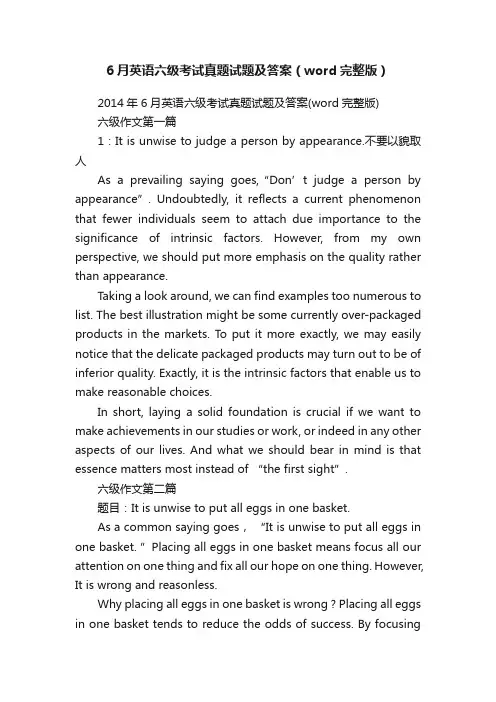
6月英语六级考试真题试题及答案(word完整版)2014年6月英语六级考试真题试题及答案(word完整版)六级作文第一篇1:It is unwise to judge a person by appearance.不要以貌取人As a prevailing saying goes,“Don’t judge a person by appearance”. Undoubtedly, it reflects a current phenomenon that fewer individuals seem to attach due importance to the significance of intrinsic factors. However, from my own perspective, we should put more emphasis on the quality rather than appearance.Taking a look around, we can find examples too numerous to list. The best illustration might be some currently over-packaged products in the markets. T o put it more exactly, we may easily notice that the delicate packaged products may turn out to be of inferior quality. Exactly, it is the intrinsic factors that enable us to make reasonable choices.In short, laying a solid foundation is crucial if we want to make achievements in our studies or work, or indeed in any other aspects of our lives. And what we should bear in mind is that essence matters most instead of “the first sight”.六级作文第二篇题目:It is unwise to put all eggs in one basket.As a common saying goes,“It is unwise to put all eggs in one basket. ”Placing all eggs in one basket means focus all our attention on one thing and fix all our hope on one thing. However, It is wrong and reasonless.Why placing all eggs in one basket is wrong ? Placing all eggs in one basket tends to reduce the odds of success. By focusingon one thing , people will surely improve their efficiency and proficiency. However, they will also overlook other resources and possibilities,thus,the likelihood of success will be lower. Take Jack, one of my best friends, as a case in point: he started to hunt for jobs in his senior year. Compared with other students who chose different kinds of jobs, he aimed at state-owned firms alone. Unfortunately, getting a decent job in state-owned firms is really hard for him. At last, when others got a job, he was still on the way to his interviews. suppose he choose jobs in a wider range and “place all eggs in different baskets”, he could have gotten a job much easier. Putting all eggs in one basket in unwise, a truth which is applicable to many situations.As a college student,we should endeavor to master more skills, accumulate different experience and make friends with diverse people.参考译文:俗语有云:“把鸡蛋放在一个篮子里是不明智的”。
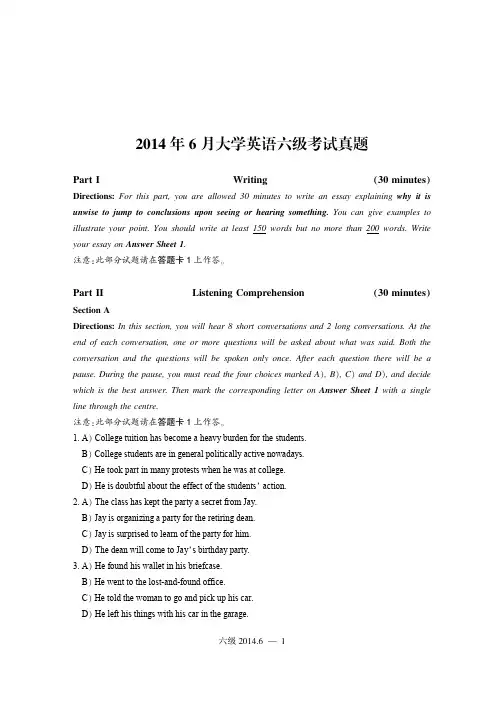
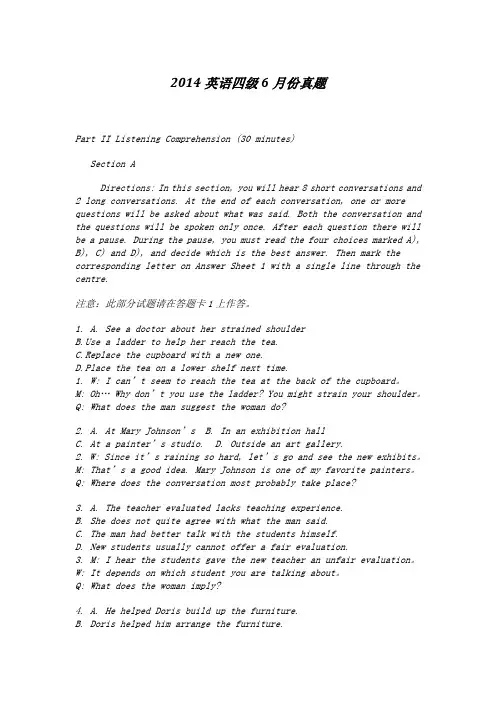
2014英语四级6月份真题Part II Listening Comprehension (30 minutes)Section ADirections: In this section, you will hear 8 short conversations and 2 long conversations. At the end of each conversation, one or more questions will be asked about what was said. Both the conversation and the questions will be spoken only once. After each question there will be a pause. During the pause, you must read the four choices marked A), B), C) and D), and decide which is the best answer. Then mark the corresponding letter on Answer Sheet 1 with a single line through the centre.注意:此部分试题请在答题卡1上作答。
1. A. See a doctor about her strained shouldere a ladder to help her reach the tea.C.Replace the cupboard with a new one.D.Place the tea on a lower shelf next time.1. W: I can’t seem to reach the tea at the back of the cupboard。
M: Oh… Why don’t you use the ladder? You might strain your shoulder。
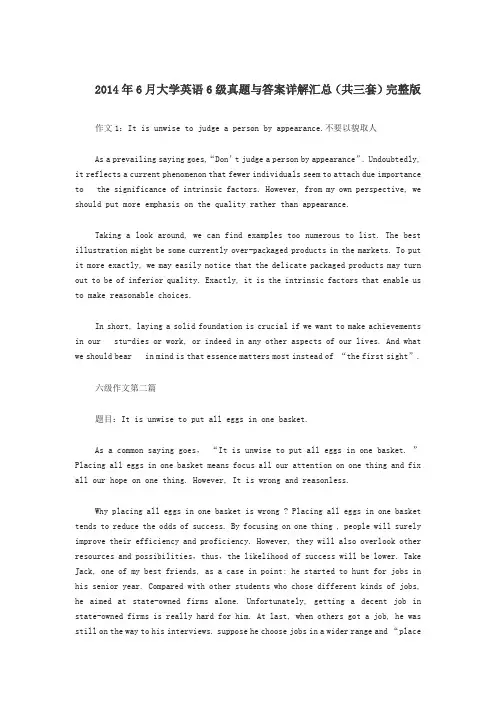
2014年6月大学英语6级真题与答案详解汇总(共三套)完整版作文1:It is unwise to judge a person by appearance.不要以貌取人As a prevailing saying goes,“Don’t judge a person by appearance”. Undoubtedly, it reflects a current phenomenon that fewer individuals seem to attach due importance to the significance of intrinsic factors. However, from my own perspective, we should put more emphasis on the quality rather than appearance.Taking a look around, we can find examples too numerous to list. The best illustration might be some currently over-packaged products in the markets. To put it more exactly, we may easily notice that the delicate packaged products may turn out to be of inferior quality. Exactly, it is the intrinsic factors that enable us to make reasonable choices.In short, laying a solid foundation is crucial if we want to make achievements in our stu-dies or work, or indeed in any other aspects of our lives. And what we should bear in mind is that essence matters most instead of “the first sight”.六级作文第二篇题目:It is unwise to put all eggs in one basket.As a common saying goes,“It is unwise to put all eggs in one basket. ”Placing all eggs in one basket means focus all our attention on one thing and fix all our hope on one thing. However, It is wrong and reasonless.Why placing all eggs in one basket is wrong ? Placing all eggs in one basket tends to reduce the odds of success. By focusing on one thing , people will surely improve their efficiency and proficiency. However, they will also overlook other resources and possibilities,thus,the likelihood of success will be lower. Take Jack, one of my best friends, as a case in point: he started to hunt for jobs in his senior year. Compared with other students who chose different kinds of jobs, he aimed at state-owned firms alone. Unfortunately, getting a decent job in state-owned firms is really hard for him. At last, when others got a job, he was still on the way to his interviews. suppose he choose jobs in a wider range and “placeall eggs in different baskets”, he could have gotten a job much easier. Putting all eggs in one basket in unwise, a truth which is applicable to many situations.As a college student,we should endeavor to master more skills, accumulate different experience and make friends with diverse people.2014年6月英语六级作文题目:看到什么、听到什么就立刻得出结论是不明智的。
2014年6月大学英语六级考试真题(三套完整版)(官方版)Part I Writing (30 minutes)(请于正式开考后半小时内完成该部分,之后将进行听力考试)第一篇Directions:For this part, you are allowed 30 minutes to write an essay explaining why it is unwise to put all your eggs in one basket. You can give explanations to illustrate your point. You should write at least 150 words but no more than 200 words.第二篇Directions: For this part, your are allowed 30 minutes to write an essay explaining why it is unwise to judge a person by appearance. You can give explain to illustrate your point. You should write at least 150 words but no more than 200 words .第三篇Directions: For this part, you are allowed 30 minutes to write an essay explaining why it is unwise to jump to conclusions upon seeing or hearing something. You can give explanations to illustrate your point. You should write at least 150 words but no more than 200 words.Part II Listening Comprehension (30 minutes)Section ADirections:In this section, you will hear 8 short conversations and 2 long conversations. At theend of each conversation, one or more questions will be asked about what was said. Both the conversation and the questions will be spoken only once. After each question there will be a pause. During the pause, you must read the four choices marked A), B), C) and D), and decide which is the best answer. Then mark the corresponding letter on Answer Sheet 1 with a single line through the centre.注意:此部分试题请在答题卡1 上作答。
2014年6月大学英语六级考试真题第一套Part I Writing (30 minutes)Directions: For this part, you are allowed 30 minutes to write an essay explaining why it is unwise to judge a person by their appearance. You can give examples to illustrate your point. You should write at least 150 words but no more than 200 words.Part II Listening Comprehension (30 minutes)Section ADirections: In this section, you will hear 8 short conversations and 2 long conversations. At the end of each conversation, one or more questions will be asked about what was said. Both the conversation and the questions will be spoken only once. After each question there will be a pause. During the pause, you must read the four choices marked A ),B., C.and D., and decide which is the best answer. Then mark the corresponding letter on Answer Sheet1 with a single line through the centre.1. A. They might be stolen goods.B.They might be fake products.C.They might be faulty products.D.They might be smuggled goods.2. A.They are civil servants. B.They are job applicants.C.They are news reporters. D.They are public speakers.3. A.The man has decided to quit his computer class. B.The woman wants to get a degree in administration. C.A computer degree is a must for administrative work. D.The man went to change the time of his computer class.4.A.A lot of contestants participated in the show. B.The fifth contestant won the biggest prize. C.It was not as exciting as he had expected. D.It was sponsored by a car manufacturer.5. A.Reading a newspaper column. B.Looking at a railway timetable.C.Driving from New York to Boston. D.Waiting for someone at the airport.6. A.He wears a coat bought in the mall. B.He got a new job at the barbershop.C.He had a finger hurt last night. D.He had his hair cut yesterday.7. A.He cannot appreciate the Picasso exhibition.B.Even his nephew can draw as well as Picasso.C.He is not quite impressed with modern paintings.D.Some drawings by kindergarten kids are excellent.8. A.He should not put the cart before the horse.B.His conduct does not square with his words.C.His attitude to student government has changed.D.He has long been involved in student government. Questions 9 to 11 are based on the conversation you have just heard.9. A.She left her own car in Manchester. B.Something went wrong with her car.C.She wants to go traveling on the weekend. D.Her car won't be back in a week's time.10.A.Safety. B.Comfort. C.Size.D.Cost.11.A.Third-party insurance. B.Value-added tax. C.Petrol. D.CDW.Questions 12 to 15 are based on the conversation you have just heard.12. A.How to update the basic facilities.B.What to do to enhance their position. C.Where to locate their plant. D.How to attract investments.13.A.Their road link to other European countries is fast.B.They are all located in the south of France.C.They are very close to each other.D.Their basic facilities are good.14.A.Try to avoid making a hasty decision.B.Take advantage of the train links.C.Talk with the local authorities. D.Conduct field surveys first.15.A.Future product distribution.B.Local employment policies. C.Road and rail links for small towns. D.Skilled workforce in the hilly region.Section BDirections.. In this section, you will hear 3 short passages. At the end of each passage, you will hear some questions. Both the passage and the questions will be spoken only once. After you hear a question, you must choose the best answer from the four choices marked A ) , B ) , C.and D ) . Then mark the corresponding letter on ,Answer Sheet 1 with a single line through the centre.Passage OneQuestions 16 to 18 are based on the passage you have just heard. 16.A.One fifth of them were on bad terms with their sisters and brothers.B.About one eighth of them admitted to lingering bitter feelings.C.More than half of them were involved in inheritance disputes.D.Most of them had broken with their sisters and brothers.17.A.Less concern with money matters.B.More experience in worldly affairs. C.Advance in age. D.Freedom from work.18.A.They have little time left to renew contact with their brothers and sisters.B.They tend to forget past unhappy memories and focus on their present needs.C.They are more tolerant of one another.D.They find close relatives more reliable.Passage TwoQuestions 19 to 22 are based on the passage you have just heard.19.A.They have bright colors and intricate patterns.B.They can only survive in parts of the Americas.C.They are the only insect that migrates along fixed routes.D.They have strong wings capable of flying long distances.20.A.In a Michigan mountain forest.B.In a Louisiana mountain forest. C.In a Kentucky mountain forest. D.In a Mexican mountain forest.21.A.Each flock of butterflies lays eggs in the same states.B.They start to lay eggs when they are nine months old.C.Each generation in a cycle lays eggs at a different place.D.Only the strongest can reach their destination to lay eggs.22.A.Evolution of monarch butterflies.B.Living habits of monarch butterflies.C.Migration patterns of monarch butterflies.D.Environmental impacts on monarch butterfly life.Passage ThreeQuestions 23 to 25 are based on the passage you have just heard.23.A.Time has become more limited.B.Time has become more precious. C.Time is money. D.Time is relative.24.A.Americans now attach more importance to the effective use of time.B.Americans today have more free time than earlier generations.C.The number of hours Americans work has increased steadily.D.More and more Americans feel pressed for time nowadays.25.A.Our interpersonal relationships improve.B.Our work efficiency increases greatly. C.Our living habits are altered. D.Our behavior is changed.Section CDirections: In this section, you will hear a passage three times. When the passage is read for the first time, you should listen carefully for its general idea. When the passage is read for the second time, you are required to fill in the blanks with the exact words you have just heard. Finally, when the passage is read for the third time, you should check what you have written.The first copyright law in the United States was passed by Congress in 1790. In 1976 Congress enacted the latest copyright law, (26) __________ the technological developments that had occurred since the passage of the Copyright Act of 1909. For example, in 1909, anyone who wanted to make a single copy of a (27) __________ work for personal use had to do so by hand. The very process (28) __________ a limitation on the quantity of materials copied. Today, a photocopier can do the work in seconds; the limitation has disappeared. The 1909 law did not provide full protection for films and sound recordings, nor did it (29) __________ the need to protect radio and television. As a result, (30) __________ of the law and abuses of the intent of the law have lessened the (31) __________ rewards of authors, artists, and producers. The 1976 Copyright Act has not prevented these abuses fully, but it has clarified the legal rights of the injured parties and given them an (32) __________ for remedy.Since 1976 the Act has been (33) __________ to include computer software, and guidelines have been adopted for fair use of television broadcasts. These changes have cleared up much of the confusion and conflict that followed (34) __________ the 1976 legislation.The fine points of the law are decided by the courts and by acceptable common practice over time. As these decisions and agreements are made, we modify our behavior accordingly. For now, we need to (35) __________ the law and its guidelines as accurately as we can and to act in a fair manner.Part III Reading Comprehension (40 minutes)Section ADirections: In this section, there is a passage with ten blanks. You are required to select one word for each blank from a list of choices given in a word bank following the passage. Read the passage through carefully before making your choices. Each choice in the bank is identified by a letter. Please mark the corresponding letter for each item on Answer Sheet 2 with a single line through the centre. You may not use any of the words in the bank more than once.Questions 36 to 45 are based on the following passage.Fear can be an effective way to change behavior. One study compared the effects of high-fear and low-fear appeals on changes in attitudes and behaviors related to dental hygiene(卫生). One group of subjects was shown awful pictures of ___36___ teeth and diseased gums; another group was shown less frightening materials such as plastic teeth, charts, and graphs. Subjects who saw the frightening materials reported more anxiety and a greater ___37___ to change the way they took care of their teeth than the low-fear group did.But were these reactions actually ___38___ into better dental hygiene practices? To answer this important question, subjects were called back to the laboratory on two ___39___ (five days and six weeks after the experiment). They chewed disclosing wafers(牙疾诊断片) that give a red stain to any uncleaned areas of the teeth and thus provided a direct ___40___ of how well they were really taking care of their teeth. The result showed that the high-fear appeal did actually result in greater and more ___41___ changes in dental hygiene. That is, the subjects ___42___ to high-fear warnings brushed their teeth more ___43___ than did those who saw low-fear warnings.However, to be an effective persuasive device it is very important that the message not be too frightening and that people be given ___44___ guidelines to help them to reduce the cause of the fear. If this isn’t done, they may reduce their anxiety by denying the message or the ___45___ of the communicator. If that happens, it is unlikely that either attitude or behavior change will occur.A) accustomedB) carefullyC) cautiously D) concreteE) credibilityF) decayedG) desireH) dimensionsI) eligibleJ) exposedK) indicationL) occasionsM) permanentN) sensitivityO) translatedSection BDirections: In this section, you are going to read a passage with ten statements attached to it. Each statement contains information given in one of the paragraphs. Identify the paragraph from which the information is derived. You may choose a paragraph more than once. Each paragraph is marked with a letter. Answer the questions by marking the corresponding letter on .Answer Sheet 2.The Street-Level SolutionA.When I was growing up, one of my father's favorite sayings (borrowed from the humorist Will Rogers) was: "It isn't what we don't know that causes the trouble; it's what we think we know that just ain't so. "One of the main insights to be taken from the 100 000 Homes Campaign and its strategy to end chronic homelessness is that, until recently, our society thought it understood the nature of homelessness, but it didn't.B.That led to a series of mistaken assumptions about why people become homeless and what they need. Many of the errors in our homelessness policies have stemmed from the conception that the homeless are a homogeneous group. It's only in the past 15 years that organizations like Common Ground, and others, have taken a street-level view of the problem--distinguishing the "episodically homeless" from the," chronically homeless" in order to understand their needs at an individual level. This is why we can now envisage a different approach--and get better results.C.Most readers expressed support for the effort, although a number were skeptical, and a few utterly dismissive, about the chances of long-term homeless people adapting well to housing. This is to be expected; it's hard to imagine what we haven't yet seen. As Niccol6 Machiavelli wrote in The Prince, one of the major obstacles in any effort to advance systemic change is the "incredulity of men," which is to say that people "do not readily believe in new things until they have had a long experience of them. " Most of us have witnessed homeless people on the streets for decades. Few have seen formerly homeless people after they have been housed successfully. We don't have reference points for that story. So we generalize from what we know--or think we know.D.But that can be misleading, even to experts. When I asked Rosanne Haggerty, founded of Common Ground, which currently operates 2 310 units of supportive housing (with 552 more under construction), what had been her biggest surprise in this work, she replied: "Fifteen years ago, I would not have believed that people who had been so broken and stuck in homelessness could thrive to the degree that they do in our buildings." And Becky Kanis, thecampaign's director, commented:"There is this sense in our minds that someone who's on the streets is almost in their DNA different from someone who has a house. The campaign is creating a first-hand experience for many people that that is really not the case."E.One of the startling realizations that I had while researching this column is that anybody could become like a homeless person--all it takes is a traumatic (创伤的) brain injury. A bicycle fall, a car accident, a slip on the ice, or if you're a soldier, a head wound--and your life could become unrecognizable. James O'Connell, a doctor who has been treating the most vulnerable homeless people on the streets of Boston for 25 years, estimates that 40 percent of the long-term homeless people he's met had such a brain injury. "For many it was a head injury prior to the time they became homeless," he said. "They became unpredictable. They'd have mood swings, fits of explosive behavior. They couldn't hold onto their jobs. Drinking made them feel better. They'd end up on the streets."F.Once homeless people return to housing, they're in a much better position to rebuild their lives. But it's important to note that housing alone is not enough. As with many complex social problems, when you get through the initial crisis, you have another problem to solve which is no less challenging. But it is a better problem.G.Over the past decade, O'Connell has seen this happen. "I spend half my time on the streets or in the hospital and the other half making house calls to people who lived for years on the streets," he said. "So from a doctor's point of view it's a delightful switch, but it's not as if putting someone in housing is the answer to addressing all of their problems. It's the first step."H.Once in housing, formerly homeless people can become isolated and lonely. If they've lived on the streets for years, they may have acquired a certain standing as well as a sense of pride in their survival skills. Now indoors, those aspects of their identity may be stripped away. Many also experience a profound disorientation at the outset. "If you're homeless for more than six months, you kind of lose your bearings," says Haggerty. "Existence becomes not about overcoming homelessness but about finding food, begging, looking for a job to survive another day. The whole process of how you define stability gets reordered."I.Many need regular, if not continuous, support with mental health problems, addictions and illnesses-and, equally important, assistance in the day-to-day challenges of life, reacquainting with family, building relationships with neighbors, finding enjoyable activities or work, managing finances, and learning how to eat healthy food.J.For some people, the best solution is to live in a communal (集体) residence, with special services. This isn't available everywhere, however. In Boston, for example, homeless people tend to be scattered in apartments throughout the city.K.Common Ground's large residences in New York offer insight into the possibilities for change when homeless people have a rich array of supports. In addition to more traditional social services, residents also make use of communal gardens, classes in things like cooking, yoga, theatre and photography, and job placement. Last year, 188 formerly homeless tenants in four of Common Ground's residences, found jobs.L.Because the properties have many services and are well-managed, Haggerty has found post housing problems to be surprisingly rare. In the past 10 years, there have been only a handful of incidents of quarrels between tenants. There is very little graffiti (破坏) or vandalism (涂鸦). And the turnover is almost negligible. In the Prince George Hotel in New York, which is home to 208 formerly homeless people and 208 low-income tenants, the average length of tenancy is close to seven years. (All residents pay 30 percent of their income for rent for the formerly homeless, this comes out of their government benefits. ) When people move on, it is usually because they've found a preferable apartment.M."Tenants also want to participate in shaping the public areas of the buildings," said Haggerty. "They formed a gardening committee. They want a terrace on the roof. Those are things I didn't count on." The most common tenant demand? "People always want more storage space--but that's true of every New Yorker," she adds. "In many ways, we're a lot like a normal apartment building. Our tenants look like anyone else."N.As I mentioned, homelessness is a catch-all for a variety of problems. A number of readers asked whether the campaign will address family homelessness, which has different causes and requires a different solution. I've been following some of the promising ideas emerging to address and prevent family homelessness. Later in 2011, I'll explore these ideas in a column. For now, l'11 conclude with an update on the 100 000 Homes Campaign. Since Tuesday, New Orleans and a few other communities have reported new results. The current count of people housed is 7 043.46. Tenants in Common Ground's residences all want more room for storage.47. Homes Campaign provides first-hand proof that the homeless are not what they were once believed to be.48. Common Ground's residences are well-managed and by and large peaceful.49. Housing the homeless is only the first step to solving all their problems.50. A large percent of the chronically homeless have suffered from brain injury.51. After being housed many homeless people become confused at first as to how to deal with life off the street.52. Some people think the best way to help the homeless is to provide them with communal housing.53. The homeless with health problems should be given regular support in their daily lives.54. Until recently American society has failed to see what homelessness is all about.55. Many formerly homeless tenants in New York's Common Ground's residences got hired.Section CDirections: There are 2 passages in this section. Each passage is followed by some questions or unfinished statements. For each of them there are four choices marked A ) ,B., C.and D ). You should decide on the best choice and mark the corresponding letter on Answer Sheet 2. with a single line through the centre.Passage OneQuestions 56 to 60 are based on the following passage.Technology can make us smarter or stupider, and we need to develop a set of principles to guide our everyday behavior and make sure that tech is improving and not hindering our mental processes. One of the big questions being debated today is: What kind of information do we need to have stored in our heads, and what kind can we leave "in the cloud," to be accessed as necessary?An increasingly powerful group within education are championing “digital literacy”. In their view, skills beat knowledge, developing “digital literacy” is more important than learning mere content, and all facts are now Google-able and therefo re unworthy of committing to memory. But even the most sophisticated digital literacy skills won’t help students and workers navigate the world if they don’t have a broad base of knowledge about how the world actually operates. If you focus on the delivery mechanism and not the content, you’re doing kids a disservice.Indeed, evidence from cognitive science challenges the notion that skills can exist independent of factual knowledge. Data from the last thirty years leads to a conclusion that is not scientifically challengeable: thinking well requires knowing facts, and that’s true not only because you need something to think about. The very processes that teachers care about most—critical thinking processes—are intimately intertwined (交织) with factual knowledge that is stored in long-term memory.In other words, just because you can Google the date of Black Tuesday doesn't mean you understand why the Great Depression happened or how it compares to our recent economic slump. There is no doubt that the students of today, and the workers of tomorrow, will need to innovate, collaborate and evaluate. But such skills can't be separated from the knowledge that gives rise to them. To innovate, you have to know what came before. To collaborate, you have to contribute knowledge to the joint venture. And to evaluate, you have to compare new information against knowledge you've already mastered.So here’s a principle for thinking in a digital world, in two parts. First, acquire a base of factual knowledge in any domain in which you want to perform well. This base supplies the essential foundation for building skills, and it can’t be outsourced (外包) to a search engine.Second, take advantage of computers’ invariable memory, but also the brain’s elaborative memory. Computers are great when you want to store information that shou ldn’t change. But brains are the superior choice when you want information to change, in interesting and useful ways: to connect up with other facts and ideas, to acquire successive layers of meaning, to steep for a while in your accumulated knowledge and experience and so produce a richer mental brew.56. What is the author's concern about the use of technology?A.It may leave knowledge "in the cloud".B.It may misguide our everyday behavior.C.It may cause a divide in the circles of education.D.It may hinder the development of thinking skills.57. What is the view of educators who advocate digital literacy?A.It helps kids to navigate the virtual world at will.B.It helps kids to broaden their scope of knowledge.C.It increases kids' efficiency of acquiring knowledge.D.It liberates kids from the burden of memorizing facts.58. What does evidence from cognitive science show?A.Knowledge is better kept in long-term memory.B.Critical thinking is based on factual knowledge.C.Study skills are essential to knowledge acquisition.D.Critical thinking means challenging existing facts.59. What does the author think is key to making evaluations?A.Gathering enough evidence before drawing conclusions.B.Mastering the basic rules and principles for evaluation.C.Connecting new information with one's accumulated knowledge.D.Understanding both what has happened and why it has happened.60. What is the author's purpose in writing the passage?A.To warn against learning through memorizing facts.B.To promote educational reform in the information age.C.To explain human brains' function in storing information.D.To challenge the prevailing overemphasis on digital literacy.Passage TwoQuestions 61 to 65 are based on the following passage.America's recent history has been a persistent tilt to the West--of people, ideas, commerce and even political power. California and Texas are the twin poles of the West, but very different ones. For most of the 20th century the home of Silicon Valley and Hollywood has been the brainier and trendier of the two. Texas has trailed behind: its stereotype has been a conservative Christian in cowboy boots. But twins can change places. Is that happening now?It is easy to find evidence that California is in a panic. At the start of this month the once golden state started paying creditors in IOUs (欠条). The gap between projected outgoings and income for the current fiscal (财政的) year has leapt to a horrible $26 billion. With no sign of a new budget to close this gulf, one credit agency has already downgraded California's debt. As budgets are cut, universities will let in fewer students, prisoners will be released early and schemes to protect the vulnerable will be rolled back.By contrast, Texas has coped well with the recession, with an unemployment rate two points below the national average and one of the lowest rates of housing repossession. In part this is because Texan banks, hard hit in the last property bust, did not overexpand this time. Texas also clearly offers a different model, based on small government. It has no state capital-gains or income tax, and a business-friendly and immigrant-tolerant attitude. It is home to more Fortune 500 companies than any other state.Despite all this, it still seems too early to hand over America's future to Texas. To begin with, that lean Texan model has its own problems. It has not invested enough in education, and many experts rightly worry about a "lost generation" of mostly Hispanic Texans with insufficient skills for the demands of the knowledge economy.Second, it has never paid to bet against a state with as many inventive people as California. Even if Hollywood has gone into depression, it still boasts an unequalled array of sunrise industries and the most brisk venture-capital industry on the planet. The state also has an awesome ability to reinvent itself--as it did when its defence industry collapsed at the end of the cold war.The truth is that both states could learn from each other. Texas still lacks California's great universities and lags in terms of culture. California could adopt not just Texas's leaner state, but also its more bipartisan (两党的) approach to politics. There is no perfect model of government: it is America's genius to have 50 public-policy laboratories competing to find out what works best.61. What does the author say about California and Texas in Paragraph 17A.They have been competing for the leading position.B.California has been superior to Texas in many ways.C.They are both models of development for other states.D.Texas's cowboy culture is less known than California's.62. What does the author say about today's California?A.Its debts are pushing it into bankruptcy. B.Its budgets have been cut by $26 billion. C.It is faced with a serious financial crisis. D.It is trying hard to protect the vulnerable.63. In what way is Texas different from California?A.It practices small government. B.It is home to traditional industries. C.It has a large Hispanic population. D.It has an enviable welfare system.64. What problem is Texas confronted with?A.Its Hispanic population is mostly illiterate.B.Its sunrise industries are shrinking rapidly.C.Its education cannot meet the needs of the knowledge economy.D.Its immigrants have a hard time adapting to its cowboy culture.65. What do we learn about American politics from the passage?A.Each state has its own way of governing.B.Most states favor a bipartisan approach.C.Parties collaborate in drawing public policies.D.All states believe in government for the people.Part IV Translation (30 minutes)Directions: For this part, you are allowed 30 minutes to translate a passage from Chinese into English. You should write your answer on Answer Sheet 2.中文热词通常反映社会变化和文化,有些在外国媒体上愈来愈流行。
【六级作文真题1】For thispart , your are allowed 30 minutes to write an essay explaining why it isunwise to judge a person by their appearance. You can give explain toillustrate your point .You should write at least 150 words but no more than 200words。
【六级作文范文参考1】Thereis an old saying that people never judge a book from its cover. From my pointof view, this saying also applies to our attitudes towards others: never judgea person from their appearance. Because you never know one person’s true meritsif only judging from their appearance。
Itis true that an attractive appearance is of great significance not only fordaily life but also for the job. However, it is unwise to judge one person bythe appearance for the following reasons. On the one hand, with the advancementof science technology and medical level, people can transform their surface byall means. On the other hand, the appearance should not be the merely criteriafor judging an individual, considering that are more important factors,including Courteous, kind-hearted, honest and so on。
2014年6月英语六级作文真题答案及解析第一篇:2014年6月英语六级作文真题答案及解析【六级作文真题1】For thispart , your are allowed 30 minutes to write an essay explaining why it isunwise to judge a person by their appearance.You can give explain toillustrate your point.You should write at least 150 words but no more than 200words。
【六级作文范文参考1】Thereis an old saying that people never judge a book from its cover.From my pointof view, this saying also applies to our attitudes towards others: never judgea person from their appearance.Because you never know one person’s true meritsif only judging from their appearance。
Itis true that an attractive appearance is of great significance not only fordaily life but also for the job.However, it is unwise to judge one person bythe appearance for the following reasons.On the one hand, with the advancementof science technology and medical level, people can transform their surface byall means.On the other hand, the appearance should not be the merely criteriafor judging an individual, considering that are more important factors,including Courteous, kind-hearted, honest and so on。
2014年6月英语四级考试真题试卷附答案2014年6月英语四级考试真题试卷附答案2014年6月英语四级考试真题试卷附答案Part I Writing (30 minutes)Directions: For this part, you are allowed 30 minutes to write a short essay on the followingtopic. You should write at least 120 words but no more than 180 words.Suppose a foreign friend of yours is coming to visit your hometown, what is the mostinteresting place you would like to take him/her to see and why?注意:此部分试题请在答题卡1上作答。
Part II Listening Comprehension (30 minutes)Section ADirections: In this section, you will hear 8 short conversations and 2 long conversations. At theend of each conversation, one or more questions will be asked about what was said. Both theconversation and the questions will be spoken only once. After each question there will be apause. During the pause, you must read the four choices marked A), B), C) and D), and decidewhich is the best answer. Then mark the corresponding letter on Answer Sheet 1 with a singleline through the centre.注意:此部分试题请在答题卡1上作答。
2014年6月大学英语六级真题及答案完整版PartI Writing ( 30minutes)Directions: For this part, you areallowed 30 minutes to write an essay explaining why it is unwise to put allyour eggs in one basket. You can give examples to illustrate your point .Youshould write at least 150 words but no more than 200 words.Directions: For this part, you areallowed 30 minutes to write an essay explaining why it is unwise a person bytheir appearance. You can give examples to illustrate your point .You shouldwrite at least 150 words but no more than 200 words.Directions: For this part, you areallowed 30 minutes to write an essay explaining why it is unwise to jump toconclusions upon seeing or hearing something. You can give examples toillustrate your point .You should write at least 150 words but no more than 200words.Part Ⅱ Listening Comprehension (30 minutes)Section ADirections:In this section,youwill hear 8 short conversations and 2 long conversations.At the end of eachconversation, one or more questions will be asked about what was said.Both theconversation and the questions will be spoken only once.After each questionthere will be a pause.During the pause,you must read the four choices markedA),B),C)and D),and decide which is the best answer.Then mark the correspondingletter on Answer Sheet1 with a single line through the centre.注意:此部分试题请在答题卡1上作答。